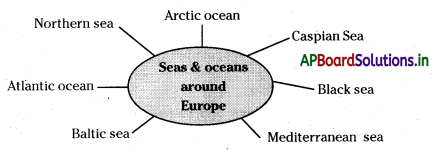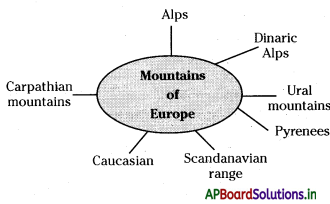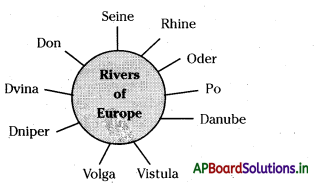Students can go through AP State Board 7th Class Social Studies Notes Chapter 5 Europe to understand and remember the concept easily.
AP State Board Syllabus 7th Class Social Studies Notes Chapter 5 Europe
→ Industrial Revolution took place first in Europe.
→ The Mediterranean sea separates Europe from North of the Africa.
→ Asia and Europe are one continuous landmass. This landmass is therefore called Eurasia. & Europe has several high snow-covered mountains.
→ The Alps, the most important mountain ranges of Europe, are covered with snow all year round.
→ The Caucasian Mountains, which lie between the Caspian Sea and the Black Sea, form the southern boundary of Europe.
→ There are no large plateaus in Europe.
→ European rivers are used not only for irrigating the fields but also as major waterways; & The sea coast of Europe is very jagged.
→ Landmasses that are surrounded by the sea on three sides and connected to the mainland on the fourth side are called peninsulas’.
→ The Landmass which is surrounded by water on all sides is called an Island.
→ Bays and gulfs are parts of the sea enclosed by land on three sides.
![]()
→ Deep gulfs or bays are preferred for building harbors as large ships can be anchored in them. & Europe has a cooler climate than ours.
→ The waters in the oceans are not static.
→ The warm currents are very good for fish breeding as they contain ample food materials for the fish.
→ The lands along the Mediterranean Sea have a distinct climate called the ‘Mediterranean climate’. & Most European countries including France have four main seasons. They are winter, spring, summer, and autumn.
→ Summer is the season of agriculture in Europe. Crops mature in this season.
→ In European countries, cultivation is possible only for 6 to 7months.
→ European plains and river valleys are very fertile.
→ Wheat is the main crop of European plains.
→ From very ancient times, the people of Europe have been trading with India and other countries of Asia like Indonesia and China.
→ About five hundred years ago, the West European sailors and traders began to search for new routes to India. The industrial revolution as you know started in England around 1750.
→ Peninsula: Landmass that is surrounded by the sea on three sides and is connected to the mainland on the fourth side is called Peninsula. E.g.: Norway and Sweden.
→ Island: A piece of land that is completely surrounded by water is called an Island. E.g.: Great Britain.
![]()
→ Bay: Bays and gulfs are parts of the sea enclosed by land on three sides. In a bay the land curves inwards and the mouth of the bay ¡s usually wide as in the Bay of Bengal.
→ Currents: Movements of water in a particular direction.
→ Gulf: A gulf is a narrow inlet of the sea and has a narrow mouth. E.g.: The entire Baltic sea is a large gulf.
→ Climate: The regular pattern of weather conditions of a particular place (country/continent).
→ Dikes (Dykes): A long thick wall that is built to stop water flooding onto a low area of land, especially from the sea or a channel that carries water away from the land.
→ Westerlies Wiñds blow all the year-round from the Atlantic Ocean towards Europe. Since they blow from the west. These winds are called Westerlies.
→ Ocean currents: The voters in the oceans are not static. They keep flowing’ from one place to another along the continents. These are the ocean currents.
→ Mediterranean climate: The lands along the Mediterranean sea have a distinct climate called the ‘Mediterranean climate’.


